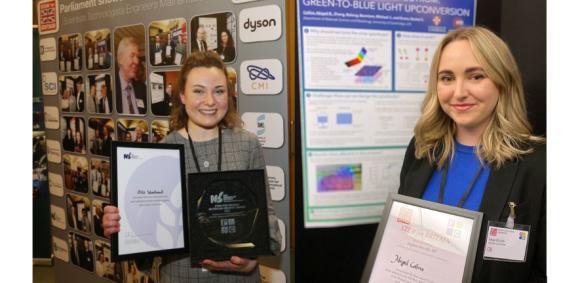
Cambridge PhD students won a trio of silver awards and a prize from the Nutrition Society, as part of the STEM for Britain poster competition organised by the Parliamentary and Science Committee.
Eleven early-career researchers from Cambridge headed to the Houses of Parliament on Monday for the finals of the 2022 STEM for Britain poster competition, organised by the Parliamentary and Science Committee. They were shortlisted from hundreds of applicants to present their biosciences research to a range of politicians and a panel of expert judges.
Four PhD students took home prizes: Abigail Collins (Chemistry), Hayden Salway (Engineering) and Hamish Symington (Plant Sciences) all won silver in their respective categories, and Orla Woodward (Wellcome-MRC Institute of Metabolic Science) won the Nutrition Society prize for the best nutrition-related poster. Other finalists from Cambridge selected to showcase their research were Dr Dr Nurulamin Noor (Cambridge University Hospitals NHS Trust), Staša Stankovic (MRC Epidemiology), Filip Boskovic (Chemistry), Gaël Kemp (Engineering), Hayden Salway (Physics), Nathaniel Tye (Engineering), Dr Andy Wang (Engineering) and Nathan Magnan (DAMTP).
Abigail commented: 'I was honoured to win Silver in Chemistry at STEM for Britain on Monday. The standard of science at the event was outstanding and it was great to be able to finally meet in person and discuss research - it was an amazing opportunity and I would encourage early-career scientists to apply next year."
Stephen Metcalfe MP, Chairman of the Parliamentary and Scientific Committee, said: “This annual competition is an important date in the parliamentary calendar because it gives MPs an opportunity to speak to a wide range of the country’s best young researchers. These early career engineers, mathematicians and scientists are the architects of our future and STEM for BRITAIN is politicians’ best opportunity to meet them and understand their work.”
The Parliamentary and Scientific Committee runs the event in collaboration with the Royal Academy of Engineering, the Royal Society of Chemistry, the Institute of Physics, the Royal Society of Biology, The Physiological Society and the Council for the Mathematical Sciences, with financial support from Dyson, Clay Mathematics Institute, United Kingdom Research and Innovation, Society of Chemical Industry, the Nutrition Society, Institute of Biomedical Science, the Heilbronn Institute for Mathematical Research, the Biochemical Society and IEEE UK & Ireland Section.
